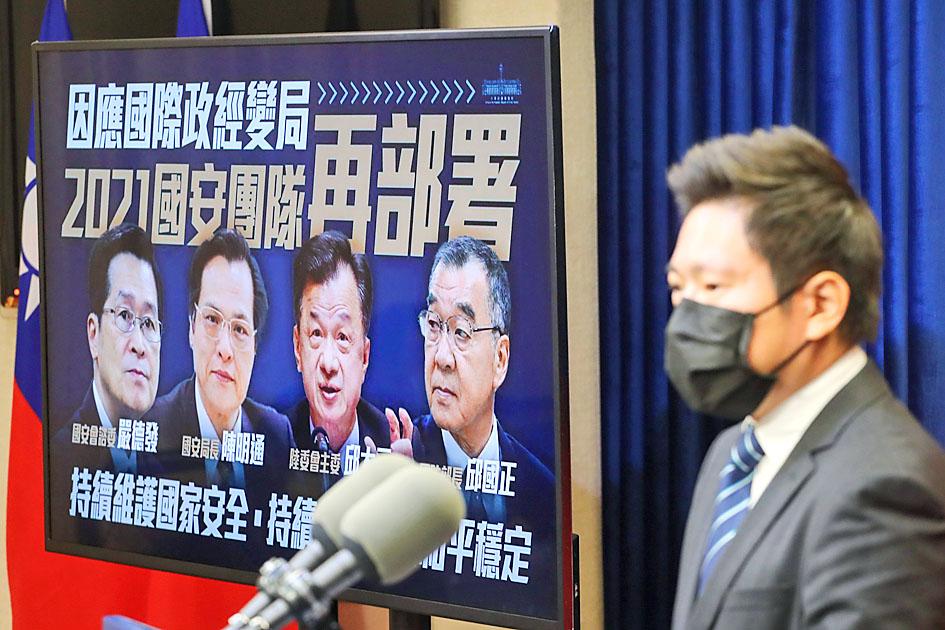President Tsai Ing-wen (蔡英文) has ordered a reshuffle of top military and security officials in the Cabinet, Presidential Office spokesman Xavier Chang (張惇涵) said yesterday.
Chang told a news conference at the Presidential Office that National Security Bureau Director-General Chiu Kuo-cheng (邱國正) is to replace Minister of National Defense Yen De-fa (嚴德發), while Yen is to become a National Security Council (NSC) consultant.
Mainland Affairs Council Minister Chen Ming-tong (陳明通) is to become the bureau’s director-general, while NSC consultant Chiu Tai-san (邱太三) is to take over Chen’s post, he said.

Photo: CNA
The transition for the four officials to their new posts is to begin next week, he added.
Tsai believes the adjustments to the national security team are necessary to meet the challenges of a post-COVID-19 pandemic world where the regional and international situation has changed, Chang said.
Tsai decided on the changes after comprehensively reviewing the situation and consulting with Premier Su Tseng-chang (蘇貞昌), Chang added.
Commenting on the reshuffle, the Chinese Nationalist Party (KMT) legislative caucus issued a statement saying the rehashing of the same cast of national security officials is a “seat and circle game” that brings no value to the relationship across the Taiwan Strait or with the US.
On the other hand, Democratic Progressive Party (DPP) lawmakers mostly supported the reshufle choices.
Having Chen, who has no military or intelligence background, assume the role at the bureau is a step forward, DPP Legislator Wang Ting-yu (王定宇) said, adding that Chen would be able to bring a new perspective to the NSB with his knowledge of cross-strait affairs.
Chiu Tai-san’s background in law and his appointment to the MAC position suggests that the government is considering national security-related laws as a point of reference when handling cross-strait affairs, as well as Hong Kong and Macau affairs, he added.
DPP Legislator Lo Chih-cheng (羅致政) said that Chiu Kuo-cheng’s experience in intelligence would be a boon to the Ministry of National Defense.
Taiwan People’s Party Legislator Ann Kao (高虹安) said that Chiu Tai-san, Chiu Kuo-cheng and Chen are all close aides of Tsai and the reshuffle of their positions seems to be nothing but a round of musical chairs.
The reshuffle shows that Tsai’s circle of confidantes remains closed and small, she added.
However, Kao said that from the perspective of a new US president, appointing experienced individuals to these positions might be the safest move.
Additional reporting by Huang Hsin-po, Chen Yu and CNA

A magnitude 5.6 earthquake struck off the coast of Yilan County at 12:37pm today, with clear shaking felt across much of northern Taiwan. There were no immediate reports of damage. The epicenter of the quake was 16.9km east-southeast of Yilan County Hall offshore at a depth of 66.8km, Central Weather Administration (CWA) data showed. The maximum intensity registered at a 4 in Yilan County’s Nanao Township (南澳) on Taiwan’s seven-tier scale. Other parts of Yilan, as well as certain areas of Hualien County, Taipei, New Taipei City, Taoyuan, Hsinchu County, Taichung and Miaoli County, recorded intensities of 3. Residents of Yilan County and Taipei received

Taiwan has secured another breakthrough in fruit exports, with jujubes, dragon fruit and lychees approved for shipment to the EU, the Ministry of Agriculture said yesterday. The Animal and Plant Health Inspection Agency on Thursday received formal notification of the approval from the EU, the ministry said, adding that the decision was expected to expand Taiwanese fruit producers’ access to high-end European markets. Taiwan exported 126 tonnes of lychees last year, valued at US$1.48 million, with Japan accounting for 102 tonnes. Other export destinations included New Zealand, Hong Kong, the US and Australia, ministry data showed. Jujube exports totaled 103 tonnes, valued at

TRUST: The KMT said it respected the US’ timing and considerations, and hoped it would continue to honor its commitments to helping Taiwan bolster its defenses and deterrence US President Donald Trump is delaying a multibillion-dollar arms sale to Taiwan to ensure his visit to Beijing is successful, a New York Times report said. The weapons sales package has stalled in the US Department of State, the report said, citing US officials it did not identify. The White House has told agencies not to push forward ahead of Trump’s meeting with Chinese President Xi Jinping (習近平), it said. The two last month held a phone call to discuss trade and geopolitical flashpoints ahead of the summit. Xi raised the Taiwan issue and urged the US to handle arms sales to

BIG SPENDERS: Foreign investors bought the most Taiwan equities since 2005, signaling confidence that an AI boom would continue to benefit chipmakers Taiwan Semiconductor Manufacturing Co’s (TSMC, 台積電) market capitalization swelled to US$2 trillion for the first time following a 4.25 percent rally in its American depositary receipts (ADR) overnight, putting the world’s biggest contract chipmaker sixth on the list of the world’s biggest companies by market capitalization, just behind Amazon.com Inc. The site CompaniesMarketcap.com ranked TSMC ahead of Saudi Aramco and Meta Platforms Inc. The Taiwanese company’s ADRs on Tuesday surged to US$385.75 on the New York Stock Exchange, as strong demand for artificial intelligence (AI) applications led to chip supply constraints and boost revenue growth to record-breaking levels. Each TSMC ADR represents